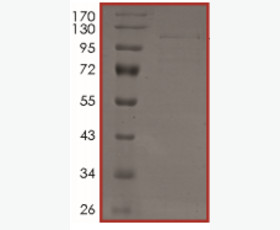Recombinant Human RANK/TNFRSF11A/CD265
| Product name: | Recombinant Human RANK/TNFRSF11A/CD265 |
| Source: | Human Cells |
| Purity: | Greater than 95% as determined by reducing SDS-PAGE. |
| Buffer Formulation: | Lyophilized from a 0.2 μm filtered solution of PBS, pH 7.4. |
| Applications: | Applications:SDS-PAGE; WB; ELISA; IP. |
| Storage: | Avoid repeated freeze/thaw cycles. Store at 2-8 oC for one month. Aliquot and store at -80 oC for 12 months. |
| UOM: | 100ug/50ug/200ug/1mg/1g |
| Source | Human Cells |
| Description | Recombinant Human Receptor Activator of NF-kappa-B is produced by our Mammalian expression system and the target gene encoding Ile30-Pro212 is expressed with a 6His tag at the C-terminus. |
| Names | CD265, ODFR, TNFRSF11A, TRANCE R, CD265, CD265 antigen, FEO, ODFROSTS, OFE, OPTB7, PDB2, RANK1, Receptor activator of NF-KB, receptor activator of nuclear factor-kappa B, TRANCER, tumor necrosis factor receptor superfamily member 11A |
| Accession # | Q9Y6Q6 |
| Formulation | Lyophilized from a 0.2 μm filtered solution of PBS, pH 7.4. |
| Shipping |
The product is shipped at ambient temperature. |
| Reconstitution |
Always centrifuge tubes before opening. Do not mix by vortex or pipetting. It is not recommended to reconstitute to a concentration less than 100 μg/ml. Dissolve the lyophilized protein in ddH2O. Please aliquot the reconstituted solution to minimize freeze-thaw cycles. |
| Storage |
Lyophilized protein should be stored at < -20°C, though stable at room temperature for 3 weeks. Reconstituted protein solution can be stored at 4-7°C for 2-7 days. Aliquots of reconstituted samples are stable at < -20°C for 3 months. |
| Purity |
Greater than 95% as determined by reducing SDS-PAGE. |
| Endotoxin | Less than 0.1 ng/µg (1 IEU/µg) as determined by LAL test. |
| Amino Acid Sequence |
IAPPCTSEKHYEHLGRCCNKCEPGKYMSSKCTTTSDSVCLPCGPDEYLDSWNEEDKCLLHKVCDT GKALVAVVAGNSTTPRRCACTAGYHWSQDCECCRRNTECAPGLGAQHPLQLNKDTVCKPCLAGYF SDAFSSTDKCRPWTNCTFLGKRVEHHGTEKSDAVCSSSLPARKPPNEPHVYLPVDHHHHHH
|
| Background | Receptor Activator of Nuclear Factor κ B (RANK), also known as CD265, TRANCE Receptor or TNFRSF11A, is member of the tumor necrosis factor receptor (TNFR) molecular superfamily. RANK is the receptor for RANK-Ligand (RANKL) and part of the RANK/RANKL/OPG signaling pathway that regulates osteoclast differentiation and activation. It plays a vital role in bone remodeling and repair, immune cell function, lymph node development, thermal regulation, and mammary gland development. RANK is constitutively expressed in skeletal muscle, thymus, liver, colon, small intestine, adrenal gland, osteoclast, mammary gland epithelial cells, prostate, vascular cell, and pancreas. |














